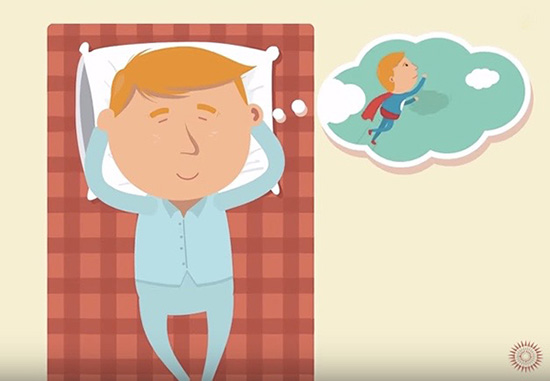How Self Hypnosis Saved a Life
4 ways self hypnosis can enhance your day-to-day life
 Self hypnosis gives you the power to decide how you're going to feel in difficult situations
Self hypnosis gives you the power to decide how you're going to feel in difficult situations
"Fortune favors the prepared mind."
- Louis Pasteur
"Self hypnosis kept me sane. No, more than that. I actually believe it kept me alive."
So said Sally, who was telling me, with all the zeal of a convert, how she'd used what she'd learned at our hypnosis workshop, which she'd attended years before. Now she was back, attending our advanced course, but (much to my delight) it seemed all she wanted to do was talk about the benefits of the first!
"I was diagnosed with cancer, I got divorced, and I went through hell financially for a couple of years... but one thing I kept was self hypnosis. I used it every day to relax, to feel positive even when things were really bad." Now she lowered her voice to a hushed, almost conspiratorial tone. "I even visualized shrinking the cancer - which has now gone!"
Now, I would never claim that hypnosis can cure cancer! Sally's cancer may have gone into remission anyway. But there's certainly evidence to suggest it can help augment conventional treatments (1) and aid post-surgical healing and comfort (2).
As Sally waxed lyrical about the wonders of self hypnosis, the clouds outside parted, and the golden light of late winter cast a warm glow across the room. An outer marvel mirroring the inner wonderments of the mind. And at that moment, I wondered whether, for Sally, the greatest gift of self hypnosis hadn't been something else altogether. Something that is vital for all of us to live well and happily.
1. Steer your own ship
"When we are no longer able to change a situation, we are challenged to change ourselves."
- Viktor E. Frankl, Man's Search for Meaning
We all need to feel we have some control in life. In fact, feeling that we are in control of our lives may even help us live longer (3).
Since I'd last seen Sally, her life had been a rollercoaster of bad fortune. Around every corner was another sling or arrow set to shoot her down. It tested Sally to what should have been breaking point. But she hadn't broken.
Life had gotten hard, difficult, painful, and uncertain. But Sally now had something with which she could control, or at least strongly influence, how she herself responded to harsh circumstances.
The focus of the hypnosis workshop years before had been how to use hypnosis to help others change their state of mind. But there had also been a section on self hypnosis, and this was something that immediately appealed to Sally - so much so that she took it a step further. As well as doing the simple self hypnotic exercise taught on the workshop, Sally had done something else.
"I pretended I was hypnotizing myself as another person... as weird as that sounds."
Actually, it's not weird at all - some of the deepest self hypnotic trances I've personally experienced have been when I have strongly evoked a sense that I was hypnotizing another part of myself, being both the subject and the hypnotist.
It's well known that dissociation is highly hypnotic. Sally had been able to develop and use her 'observing self', the part that can stand aside from the contents of consciousness and just watch. In this way she had felt able to, in some sense, transcend the contents of her life and mind.
Even when Sally had felt as though she was about to be engulfed by terrifying forces beyond her control, she still felt she could control herself - and that is priceless. Self hypnosis is an incredibly powerful tool to control how you feel and respond to situations.
But self hypnosis is not just for coping with bad situations. To use self hypnosis regularly is to tap into the health benefits of a very deep and ancient human endowment. And this is really worth knowing about.
2. Let the rhythms of life guide you
As the hypnosis course continued around me, something caught my eye. Through the window I watched a gull glide over the whipping wind. I was struck by how it barely moved its wings. It just used the air currents to lift it, with elegant economy, up into the morning air.
The rhythms of nature are all around us, but also inside us. Sally had learned about a certain inner rhythm at that first workshop and had thereafter linked her self hypnosis to those natural inner ebbs and flows, just as the gull had made use of nature to fly more easily. You can benefit from this too. I'll explain what I mean.
You may have heard of the 'circadian rhythm' - the 24-hour bodily cycle that regulates our wakefulness over the course of the day and night. This circadian rhythm is the reason we feel like getting up in the morning (hopefully!) and the reason we feel sleepy at bedtime. But there's another type of bodily rhythm that occurs in a much shorter cycle - the 'ultradian' rhythm.
There are many kinds of ultradian rhythms, but one has been shown to moderate 'hemispheric dominance' within the brain. This is important.
The left hemisphere is more specialized for linear, logical thought and communication, while the right is more active when we are relaxed or dreaming or in hypnosis. Of course, this is a generalization - there is a huge amount of overlap and interplay between your brain's hemispheres - but it broadly correlates with what has been observed. So how does this relate to our ultradian rhythm?
In normal conditions, you will have the capacity for around 90 to 120 minutes of focused attention after getting out of bed in the morning. During this time, your left hemisphere is doing most of the work. This is followed by a 20-minute period of lesser focus, during which your right hemisphere takes control. You might feel your mind start to wander or have difficulty concentrating. And so the rhythm begins.
During this 20-minute period you are more likely to daydream, feel sleepy, or even 'trance out' a little. But just because this is the way our ultradian rhythm is programmed doesn't necessarily mean it's the way it always happens.
When we feel a lapse in concentration we will often grab a coffee or smoke a cigarette as a way of 'cheating' this natural break. And when we're stressed, certain chemicals are released in the brain that have a stimulant effect and interfere with this gently lapping of a natural 'trance tide'. Stress effectively overrides our ultradian rhythm.
This might sound like a good thing - more focus, better productivity! However, it has been shown that taking advantage of our natural rhythm has profound physical and mental health benefits (4). You are much better off doing just what your brain is asking you to do - relax! At least a few times a week you should make an effort to go with the shift, rather than trying to manipulate your inner ebbs and flows to fit in with the demands of a 'left brain' world.
If we ignore these ebbs and flows too often, if we refuse to submit and relax during our ultradian shifts, then our immune function and mental health may eventually suffer. Sometimes staring through the window at nature for 10 minutes or, even better, really going with the rhythm and letting it carry you all the way into a beatific hypnotic trance, can help you feel more at one with the nature of who you are.
Being able to use self hypnosis at these times is a highly efficient way to relax quickly and deeply, and maximize the benefits to your body and mind. Indeed, there is no better time to do self hypnosis than when you are naturally entering the right-brain phase of your ultradian rhythm. This is a powerful reason to get into the habit of self hypnosis - when you become more in tune with your natural daily rhythms, your body is able to naturally regulate blood pressure, immune function, emotional processing and more.
But more than simply helping health, using self hypnosis can help your mind make creative associations that otherwise may have been missed.
3. Let the inspiration come to you
Sally told me she had gained so many "inspirations and insights" while using self hypnosis. And she's certainly not alone. Many of the most important discoveries in history have been made in a hypnotic state. Don't believe me?
Archimedes had been working on the problem of how to accurately measure the density of gold to determine its authenticity. But an answer wasn't forthcoming, and it seemed as if his conscious mind had done all it could. Legend has it he was relaxing into his bath and letting the balming waters coddle him into natural trance, when suddenly he shrieked "Eureka!" He had seen - not worked out, but perceived with real 'in-sight' - the solution to the problem by linking it to the displacement of water in his own bathtub.
More recently, in the 19th century, chemist Friedrich August Kekulé was desperately trying to understand the structure of the chemical compound benzene. He had been working on the problem for many years. One evening as he sat by an open fire, he began to feel sleepy. He drifted off into a daydream - a waking, hypnotic dream. As he began to spontaneously visualize, suddenly he saw a coiled up snake bite its own tail, forming a circle. And so the ring-like structure of benzene was discovered. From this trance-like experience, this in-sight, organic chemists learned how to make thousands of benzene derivatives for industrial, medical, and other uses.
Albert Einstein was inspired to develop his General Theory of Relativity after daydreaming about being a beam of light travelling to Earth from the Sun. Realizing the power of the altered state of mind, he famously said "We cannot solve our problems with the same thinking we used when we created them."
The mind needs to be in the right state to discover, to learn, to make connections, and sometimes to decipher hidden meanings in our everyday lives and even within ourselves.
But it's also true to say that our outer selves are reflections of our inner selves. If we prepare ourselves to be a certain way inwardly, we can alter how we act and interact out there in the world. Again, Sally had an amazing story to tell about this.
4. Feel how you want to feel
Sally had gone through a horrible divorce. Her husband of 18 years had begun an affair with the mother of a friend of their daughter and eventually left Sally to live with her.
"But I knew I'd have to see her after the school holidays when I dropped my daughter off," Sally told me. "I was terrified I might lose control completely, cry, feel crushed, scream and shout, or even attack the woman. I spent weeks dreading the day I'd be near her." She looked me in the eye.
"But then I thought: Why should I leave it to chance? Why shouldn't I decide how I was going to feel when I saw her?"
And this is such a key aspect of self hypnosis!
So many of us plan stuff. What we're going to say, what time we're going to arrive, how we're going to dress. We plan all that, but we leave how we're going to feel to chance. So we go into that difficult meeting with the boss or make that hard phone call or go out on that first date in ten years, and we cross our fingers and hope we'll feel calm or confident. We hope we'll be okay - but barely hope to be more than okay.
Why are we leaving the most important part of these interactions to chance? As Sally can testify, mental rehearsal is powerful. We can prime our own powerful minds to be the way we want.
And self hypnosis is the best way to do it.
"I self hypnotized really deeply and had the experience of seeing myself from the outside looking calm, dignified, and relaxed when I saw the woman at school. I saw her shrinking down to almost nothing. And I kept on doing this, until finally I could feel totally relaxed - no, more than that, actually indifferent - seeing her in my mind."
During the break, Sally told me over coffee how amazing it was to drop her son off and actually get so engrossed in chatting to another parent that she forgot about the woman her husband had run away with. When she did finally notice her, she felt nothing in particular - the woman was nothing more than a tiny part of the overall situation. But Sally remembered how nervous and embarrassed the woman had looked. "Maybe she should have done some self hypnosis", Sally said with a glint in her eye.
It's been said that all hypnosis is self hypnosis, and in a way that's true. Whenever we help someone into hypnosis we simply enable them to change their state of consciousness. It's still them changing it.
Like they did for Sally, and millions of others lucky enough to have discovered hypnosis, the benefits can truly change your life. If you ask Sally, it might even save your life.
If you're feeling the pressure, why not try our Stress Management Pack ?






